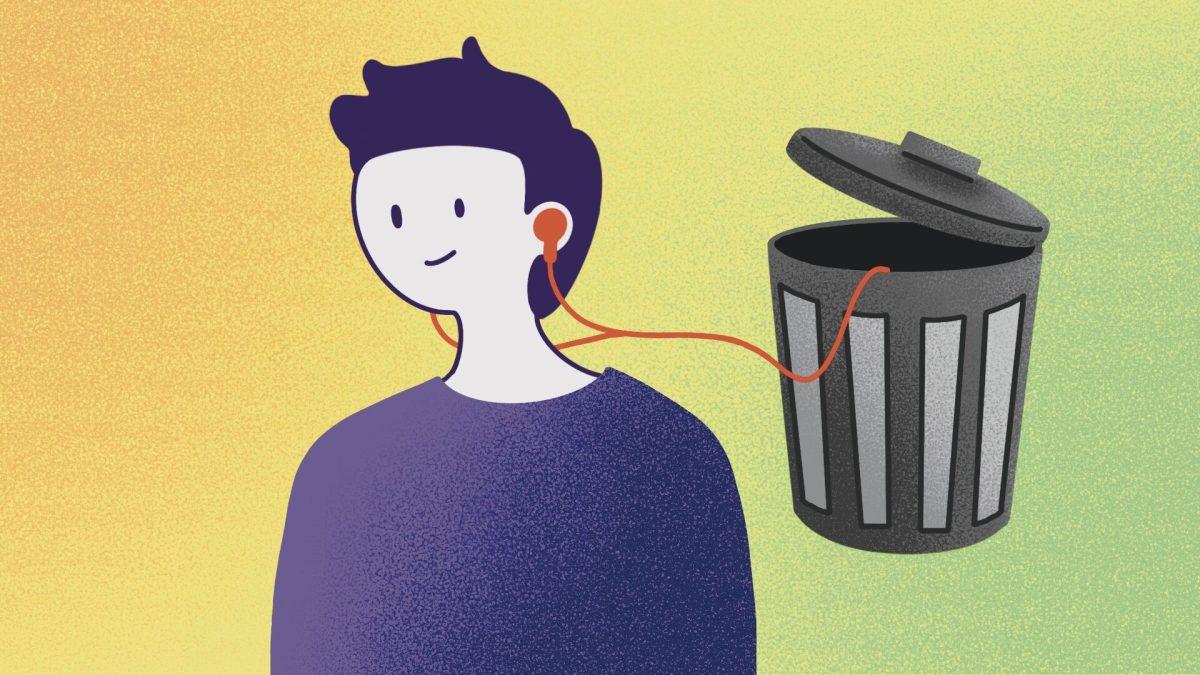Our grandparents were blessed with the days when sweet melodies by Frank Sinatra, Louis Armstrong and Nat King Cole were released. Our parents had Prince and Madonna in their prime. These 20th century musicians released songs about love and beauty, inspiring a sense of peace within their listeners.
In recent decades, music has lost all of its charm. As listeners in today’s world, it’s nearly impossible to escape vulgar language, romanticization of violence, objectification of women and nonsensical lyrics.
This saga of classless music began in the early 2000s and has gone downhill since.
For example, in 2008, Lil Wayne not-so-eloquently introduced the lyric, “I was leaving skid marks on everywhere I sit.” In another one of his songs, he tells someone to die and sings, “I hope you bleed a lake.”
Earlier this year, the top five of Billboard’s Hot 100 included “Lovin’ on Me” by Jack Harlow and “Paint the Town Red” by Doja Cat. The former explicitly references Harlow’s sexual preferences as he sings, “I’m vanilla, baby, I’ll choke you, but I ain’t no killer, baby,” and the latter’s use of profanity and satanic references is simply distasteful.
In many instances, older musicians referenced similar topics but with a significantly greater level of grace, resorting to metaphors and sexual innuendos rather than being unnecessarily blunt like today’s singers.
Modern day musicians with lackluster songwriting abilities resort to offensive language to make their work stand out and appeal to the younger generations. Included in the same Billboard list is Nicki Minaj’s “FTCU,” which uses “f–k” 35 times. This makes up 8% of the entire song.
Similarly, mumble rap, which focuses on melody rather than lyrics, has been popularized. Songs within this genre rarely convey a message. Instead, they generally discuss nothing more than women, drugs and money. Although many of these songs flow well and have catchy beats, their slurred, unintelligible lyrics are hard to look past.
“Panda” by Desiigner and “Trap Queen” by Fetty Wap are a few examples of songs that can be classified as mumble rap. The stark difference in sound quality and lyrics between these tracks and older rap songs makes a statement for itself. Contrary to this generation of rappers, Young MC, Dr. Dre and other artists from the late 20th century showcased real talent through their clear lyrics and do it without autotune.
The sexualization of women has also plagued recent music. In addition to the repulsive way some male musicians discuss women by calling them profane and misogynistic names, female singers are also responsible for this sexualization.
Even disregarding their lyrics, some female artists rid themselves of any sense of class to attract attention and gain more listeners. Take Olivia Rodrigo’s hip-thrusting choreography, Sabrina Carpenter’s infamous outros or any one of Cardi B’s music videos as examples.
This is not female liberation; it’s objectification. What happened to sophistication and self-respect?
Of course, there are exceptions to the problematic nature of modern music. Stephen Sanchez, with his hit song “Until I Found You,” brought back the wholesome lyrics and sounds from the 1950s. Similarly, rising stars like Benson Boone and Lord Huron have produced some of the century’s best lyrics, not to mention country artists such as Zach Bryan and Morgan Wallen.
Lil Wayne has also produced meaningful songs. For example, his hit “Kobe Bryant” serves as a tribute to the basketball legend.
Thus, none of this is to say that Fetty Wap, Olivia Rodrigo or any of the other artists mentioned are not talented. In fact, they are undoubtedly paving the way for America’s future of music. However, the foul language, sexual objectification and empty lyrics need to be toned down because the nonsense we are listening to has consequences.
According to the American Psychological Association, listening to violent song lyrics can lead to increased negative emotions, aggression and hostility. Contrastingly, listening to prosocial music has been associated with increased positive thoughts and empathy.
Next time you put your headphones on or turn up the radio, consider listening to music from your parent’s generation, whether that be anything from Stevie Wonder to Queen to ABBA. It’s not for everyone, but it certainly is a refreshing contrast to our generation’s drivel.














